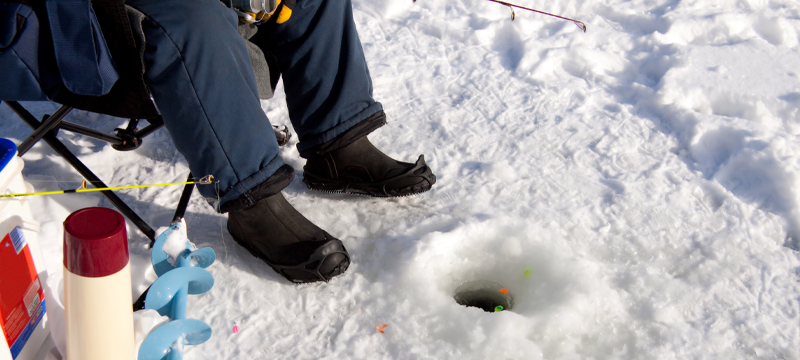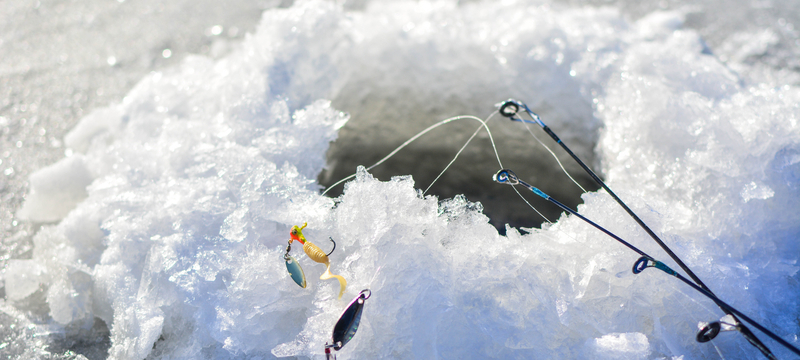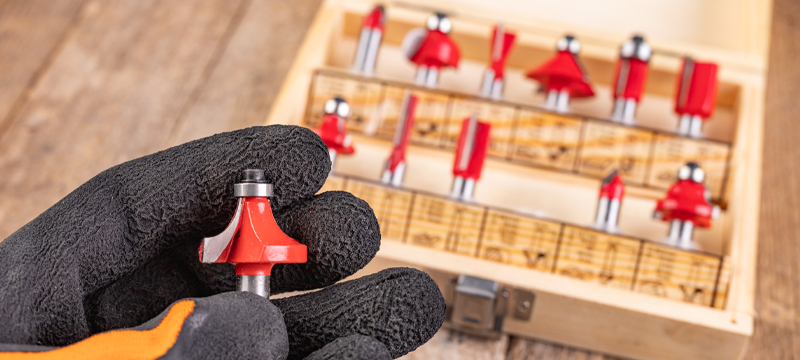Finding ways to pass the time during the chilly winter months can be challenging. Ice fishing is a beautiful way to spend time with friends and family and allows you to enjoy lakes and rivers without a boat. If you are looking to accept a new hobby and want information on a pastime you can love, we’re here to help.
Together, we will dive into the necessary equipment, tips and tricks, and frequently asked questions.
Ice Fishing Gear
To get started ice fishing, you will need to get the correct ice fishing gear.
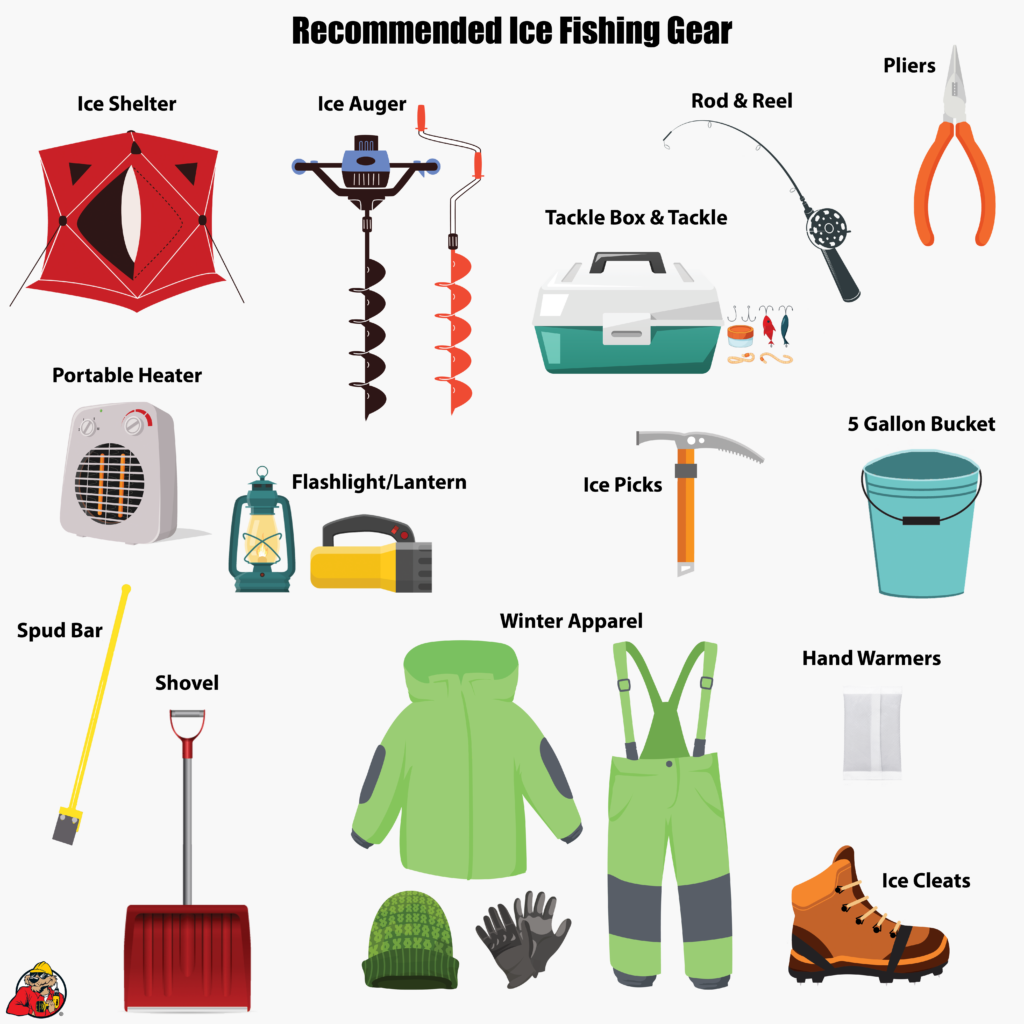
If you are heading out on the ice, here are some essentials that you may not want to leave home without:
Ice fishing shelter
An ice fishing shelter is one of the most essential items for your ice fishing expedition. Also known as an ice fishing tent, ice fishing house, or ice hut, this portable structure is the key to a comfortable and successful fishing experience. It keeps the wind at bay and your gear organized, making your time on the ice more enjoyable. A famous brand for ice fishing gear is Eskimo Ice Fishing, offering a range of products, including ice augers, ice shanties, and ice fishing apparel.
Shelter Recommendation: Eskimo Quickfish Portable Pop-Up Ice Fishing House
Ice fishing rod and reels
When it comes to ice fishing, regular fishing rods just will not cut it. You will need a specialized tool- an ice fishing rod. These rods are shorter and smaller than their open-water counterparts, designed to keep you close to the hole and make it easier to detect when a fish bites. Ice fishing reels also have their unique features, typically equipped with the following:
- One to three bearings, unlike the five or more found in open-water fishing reels.
Tacklebox and Tackle: lures, jigs, bait, bobbers, hook sharpener
Fish are typically less aggressive during ice fishing season, so use ice fishing-specific tackle as it is smaller and less daunting to fish. Jigs and tip-ups are favored ice fishing tackle; however, depending on what you are fishing for, you will want to research what tackle works best to save you money and time on the ice. Please pick up a tackle box to keep your tackle organized and prevent it from getting broken.
Tacklebox Recommendation: CLC Multi Tackle Small Backpack
Needle-nose pliers
Needle-nose pliers are a terrific addition to your tacklebox for unhooking fish, cutting lines, tightening hooks, and more. Some experienced anglers, such as people who fish with a fishing rod, even say pliers are the most valuable tool to pack.
Plier Recommendation: Channellock 6″ Long Nose Plier with Side Cutter
Flashlight or lantern
Ice fishing can be an all-day activity, so you might be on the ice after sunrise. Grab a flashlight, lantern, or both to gather your things and return to shore safely.
Lantern Recommendation: Rayovac 1,130-lumen Fluorescent Handheld Battery Flashlight
Flashlight Recommendation: Klein Tools Flashlight with Worklight Rechargeable
Listen to music and light up the night with the Makita Outdoor Adventure 18V LXT Radio & LED Lantern!
Portable heater
A portable heater is the most convenient way to heat your icehouse. Propane heaters deliver a steady, comfortable warmth and allow easy transportation to and from your fishing spot. With a wide variety of heater sizes, finding the right fit for your ice shelter will be effortless.
Recommended: Mr. Heater 9,000 BTU Portable Buddy Propane Heater
Ice auger
An ice auger is used to drill holes in the ice, usually between 6 and 10 inches in diameter. There are two kinds of drills: hand and power. Hand augers are manual ice fishing augers that drill through the ice like power augers; however, they are cheaper and lighter. Power drills can be gas or battery-powered, allowing ice fishing holes to be drilled quickly and effortlessly.
Recommended Hand Auger: Eskimo Dual-Flat Blade Hand Auger 6″
Recommended Power Auger: Toro Earth Auger with Powerhead 8″ 52cc 2 Cycle
5-gallon bucket
A 5-gallon bucket is multifunctional for ice fishing. It can be used as a seat, to carry gear, or to hold your day’s catches.
Recommended: Acme Tools Milwaukee Bucket Red 5 Gallon
Hand warmers
Pocket-sized hand warmers can be activated when exposed to air and keep your hands toasty even on the coldest days. Slip them into your pockets or gloves for up to 10 hours, depending on your favorite brand or the one you purchased.
Recommended: Occunomix Hi-Vis Orange Heat Pax Hand Warmers 5pk
Ice cleats
Ice cleats improve traction on the ice, making them perfect for ice fishing. They are designed to promote natural walking, even in slippery conditions. Ice cleats are adjustable and will fit over your winter boots.
Recommended: K1 Series Original Mid Sole Ice Cleat
Spud bar
Many of those with ice fishing experience suggest using a spud bar to check the thickness of the ice. A spud bar is a heavy metal rod with a flat, sharp blade on one end. It can be used to drive into the ice, creating a hole that can then be measured with tape to determine depth.
Recommended: Tranzsporter Spud Bar 3 1/2″ Bladeknob Handle
Ice picks
Safety is the priority on the ice; taking precautions to ensure the ice is thick enough to fish on is the most significant step. However, we know accidents happen, so it is best to be prepared. Ice picks are designed to hang around your neck, so they are readily available if you fall through the ice. They allow you to get traction on wet ice to pull yourself out of the water.
Shovel
Shovels work great for clearing snow off the ice to set up your icehouse and drill your hole quickly. They are also handy for removing any slush around your ice hole. A collapsible shovel is an excellent addition to your ice fishing gear.
Recommended: Marshalltown Proscape Folding Shovel Square Point
Clothing
Weather on the ice can change quickly, so proper clothing is essential. Layering is the quickest way to regulate your body temperature. There is a wide variety of apparel options, such as t-shirts, long-sleeved shirts, bibs, sweatshirts, and more. Research your intended fishing area to determine what clothing you will need; here are a few recommendations:
Eskimo sells Bibs with Uplyft™ Float Assist Technology in adults’ and children’s sizes. The wind, rain, snow, and ice-proof bibs feature a Sherpa fleece lining, cargo pocket storage, and full-leg zippers.
Other recommended equipment:
• Compass
• Matches or lighter
• Ice scoop
Tips & Tricks
- Check the state and waterway fishing regulations where you will be fishing.
- Purchase a valid fishing license in the state where you will be fishing.
- Consider bringing a cooler and packing snacks and drinks if you plan to stay on the ice for a while. Consider a snacklebox to keep your snacks organized. Check out our blog below for more information.
- If you bring kids, pack extra clothes, gloves, tissues, and activities to entertain them.
- Bring sunglasses, sunscreen, and chapstick with SPF. Sunburn can and will happen without protection.
Frequently Asked Questions
If you are unfamiliar with the area, ask a local expert about ice conditions. Ice under 2″ should be avoided. If you are walking on ice, ice fishing, or skating, ice should be at least 4″. Snowmobiles and ATVs should only be used on at least 5″ of ice. Ice eight” or more is considered safe for passenger cars and small trucks. Medium trucks should not be driven on less than 12″ thick ice.
This information is only for solid, transparent, blue/black ponds and lake ice. Slush ice has half the strength of the above ice, and the strength value of river ice is 15% less.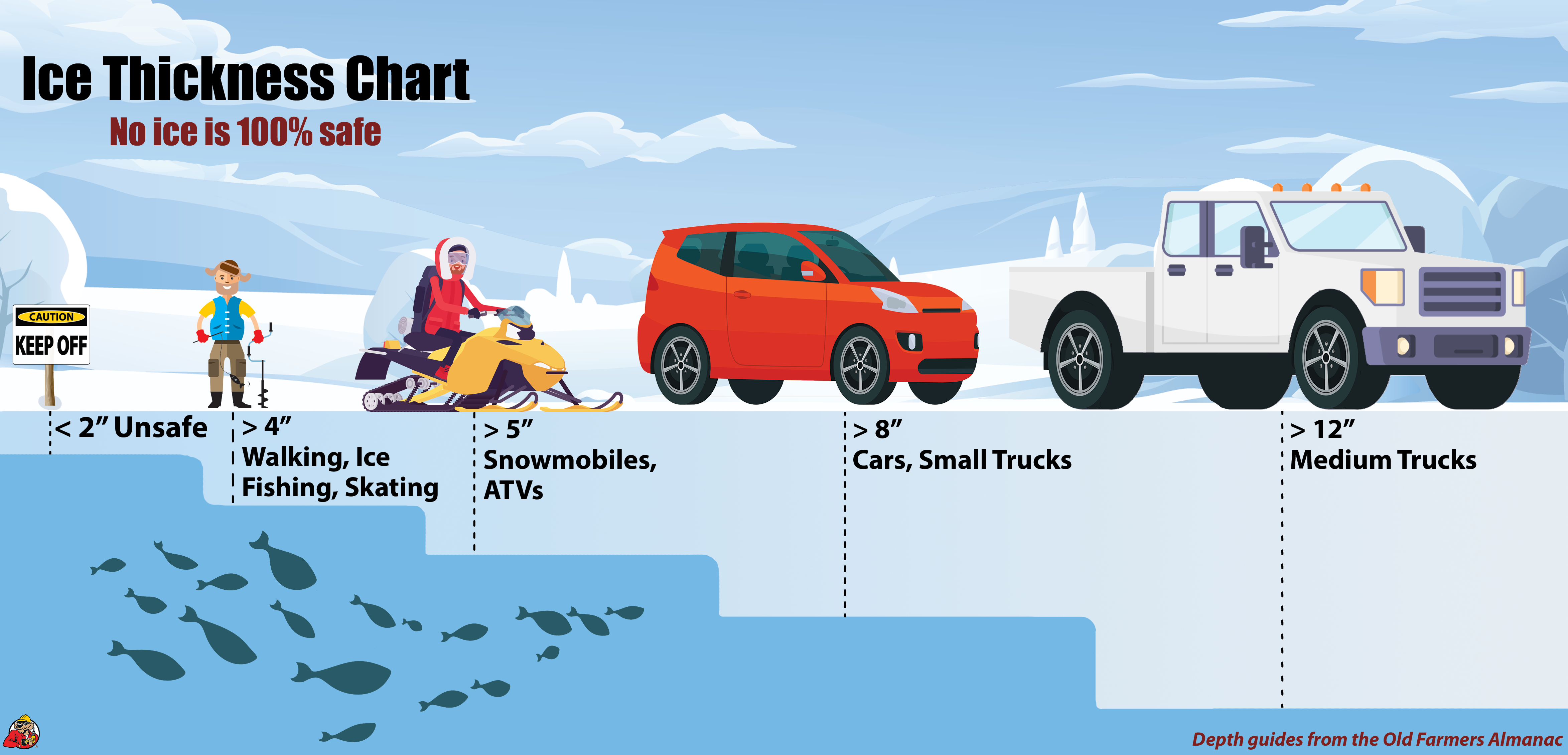
Note: These rough guidelines apply only to new, clear ice. Proceed at your own risk.
A general rule is to wait until the ice is four inches thick.
The first couple hours after sunrise and two hours before and after sunset are the best time to ice fish.
Many experienced anglers recommend minnows, wax worms, spikes, and wigglers if you want to use live bait. You can also use artificial ice fishing bait.

